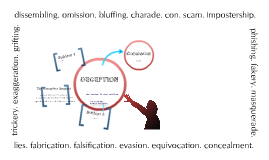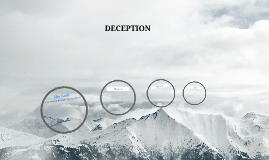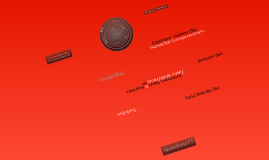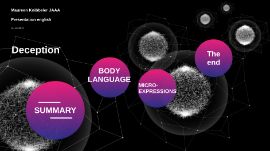Deception
Transcript: LADY MACBETH “ I have drugged their possets, That death and nature do contend about them, Whether they live or die.” (ACT 2 SCENE 2 Paragraph 1 line 8) " Now does he feel his title Hang loose about him, like a giant’s robe Upon a dwarfish thief." - Angus Scene 2 lines 20-22 Angus is saying that Macbeth is very small and cant fit the part of a king. Macbeth deceived everyone by making everyone believe that he was a great king and that he was not the person who murdered the king by framing Duncan's sons. The plotting of Duncans death. “So is he mine; and in such bloody distance That every minute of his being thrusts Against my near’st of life. And though I could With barefaced power sweep him from my sight And bid my will avouch it, yet I must not, For certain friends that are both his and mine, Whose loves I may not drop, but wail his fall Who I myself struck down. And thence it is, That I to your assistance do make love, Masking the business from the common eye For sundry weighty reasons” (Macbeth, act 3, scene 1, lines 119-129) This is an act of deception on Macbeth’s part because he is explaining to himself that he needs to kill Banquo secretly otherwise mutual friends of theirs that he needs will turn against him. This is an act of deception because Macbeth istelling banquo if he helps with whatever he asks he will make an honour for him. But instead he kills him. “Were the graced person of our Banquo present, Who may I rather challenge for unkindness Than pity for mischance.” (Macbeth, act 3 scene 4, lines 43-45) This is an act of deception of Macbeth’s part because he is lying to the party guests about Banquos whereabouts, making it seem as though he has nothing to do with Banquos absence. "Within this three mile may you see it coming; I say, a moving grove." -Messenger Scene 5. lines 36-37 Macbeth's messenger is telling him that he seems to see a moving forest about 3 miles away from the castle. The English army is decieving Macbeth and his messenger by carrying the branches to Birnam wood in front of them, giving off the impression from far away that a forest is moving their way. LADY MACBETH “Woe, alas! What, in our house?” (ACT SCENE 3 PAGE 5) Macbeth Motif Project verbal and actions of deception to secure Macbeth's throne and to make it last MACBETH “If you shall cleave to my consent, when ’tis, It shall make honor for you” (ACT 2 SCENE 1 PAGE 2) MACBETH “Being unprepared, Our will became the servant to defect, Which else should free have wrought” (ACT 2 SCENE 1 Last paragraph line 17) This is an example of deception because lady Macbeth is saying the drunk guards are set up to take the blame of Duncans death. She had put so many drugs in their drink so they would not wake up. Do to being passed out when they were supposed to be guarding Duncans room. They could easily be put to blame for what her and her husband have done. Elements of Deception "Our castle’s strength. Will laugh a siege to scorn" - Macbeth Scene 5. lines 2-3 Macbeth is telling everyone that his castle is strong enough to defend them from the English army without a doubt. He is deceving the people in his castle because his castle will not be strong enough to defend them and himself Macbeth towards his followers “Apply to Banquo; present him eminence, Both with eye and tongue: unsafe the while that we Must lave our honors in these flattering streams, And make our faces vizards to our hearts, Disguising what they are.” (Macbeth, act 3, scene 2, lines 33-37) This is an act of deception on Macbeth’s part because he is explaining to Lady Macbeth that they should flatter Banquo to the party guests in order to hide their true intentions of killing him. Theme Statement: “Well then, now Have you considered of my speeches? Know That it was he, in the times past, which held you So under fortune, which you thought had been Our innocent self. This I made good to you In our last conference, passed in probation with you, How you were borne in hand, how crossed, the instruments, Who wrought with them, and all things else that might To half a soul and to a notion crazed Say, “Thus did Banquo.”” (Macbeth, act 3, scene 1, lines 77-89) This is an act of deception on Macbeth’s part because he is trying to trick the murderers into killing Banquo by convincing them that Banquo is evil and he is good. By Jack, Charl, and Hannah This is an example of deception because Lady Macbeth is acting like she had no idea of the crime of Duncans death happened in her house when really she was the one who committed it. “We hear our bloody cousins are bestowed In England and in Ireland, not confessing Their cruel parricide, filling their hearers With strange invention” (Macbeth, act 3, scene 1, lines 31-34) This is an act of deception on Macbeth’s part because he is covering up his murder of King Duncan by framing Malcolm and Donalbain, who have both fled the country. The Murder of Banquo This is an act of deception because Macbeth is saying he isn't prepared to

















